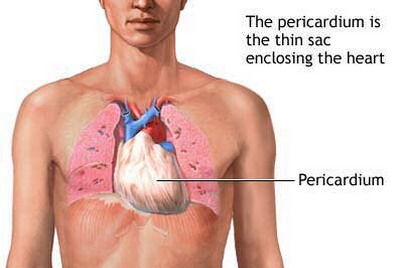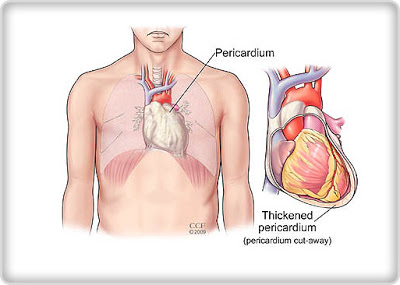Pericardial Mesothelioma
Posted on Tuesday, April 26th, 2016 at 2:11 pm
Pericardial mesothelioma originates in the lining of the heart that is called the pericardium. Pericardial mesothelioma is a rare form of mesothelioma and accounts for 10% of all .
Pericardial mesothelioma is caused by asbestos exposure. Exact evidence of how asbestos exposure causes pericardial mesothelioma is inconclusive. This was noted in a study conducted in 1982 which found that in 15 cases of pericardial mesothelioma 3 cases had history of asbestos exposure and also a study conducted in 1994 which found that in 15 cases of pericardial mesothelioma only 4 cases had a history of asbestos exposure.
How Asbestos Causes Pericardial mesothelioma

Pericardial Mesothelioma – Normal pericardium

Pericardial Mesothelioma – Thickened pericardium
Inhaled asbestos fibers are absorbed into the blood stream and become entangled in the heart’s lining. The fibers are transported to the heart by way of blood flow processes. The asbestos fibers can become lodged in the membranes that surround the heart. The body fails to expel the fibers and after some time the fibers cause cells to genetically change, the results are cancer cells. Once the cells are cancerous they begin to divide rapidly and they cause the lining of the heart to thicken and eventually tumors develop. These changes also lead to fluid building up in the membrane between the two pericardial layers. The fluid buildup combined with the thickening of the pericardial layers puts pressure on the heart.
Pericardial mesothelioma develops over a long period of time between 10-50 years and is therefore discovered in the late stage. It is common in people between the ages of 50-70. It affects twice as many men as it does women.
Symptoms
Most symptoms are caused by the fluid buildup around the heart and thickened pericardial layers. Diagnosis is hard because the symptoms are similar to other heart conditions.
The most common symptoms are:
- Heart palpitations
- Difficulty breathing
- Cough
- Fatigue
- Shortness of breath
- Night sweats
- Chest pain
- Fever
- Murmurs